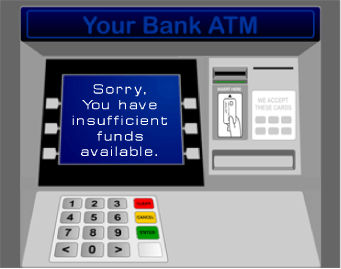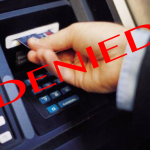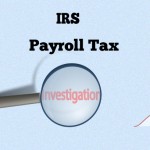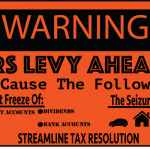Craig Thomas
Latest posts by Craig Thomas (see all)
- Chris Feels Victorious - September 8, 2016
- Are You At Risk of a Levy? - May 26, 2016
- 3 Ways To Survive Your Spouse’s Tax Troubles - February 15, 2016
What Is A Levy?
A levy is a legal seizure of your property if you don’t pay your taxes. Many are unaware that the IRS can seize virtually any possession of yours (short of your kids). Below, are just a few examples, but not all inclusive:
- Car
- Boat
- House
- Wages
- Retirement Accounts
- Bank Accounts
- Dividends
- Accounts Receivables
The most common form of levy is a bank levy.
When Should You Expect A Levy To Hit?
If you owe the government, you will receive a Notice and Demand for Payment. If you ignore or refused to pay the tax, then you will receive a Final Notice of Intent to Levy and Notice of Your Right to A Hearing (levy notice) at least 30 days before the levy actually happens. After the 30 days has expired, it is just a matter of time before your bank will be receiving an order to freeze your accounts.
What Will Your Bank Do?
Once your financial institution receives the levy order from the IRS, they will immediately freeze all accounts specified by the government. Basically, any account registered under your social security number is at risk.
Your funds will be held in suspense for a total of 21 days. It’s useless to attempt to negotiate a solution with the bank because they are legally obligated to honor the levy. No one can access the funds during this period. Once the 21-day period passes, the funds are remitted to the IRS.
Any money deposited after the bank’s receipt of the levy will not be affected. You will have full access to your deposited funds. In order for the IRS to confiscate funds deposited after the initial levy, they must officially issue another bank levy.
IRS Error?
The IRS is no different than humans in that they make mistakes too.
The following are examples of missteps that could lead to a premature levy on your bank accounts:
- You paid all you owed before the IRS sent the levy notice
- The IRS assessed the tax and sent the levy notice when you were in bankruptcy, and subject to the automatic stay during bankruptcy
- The IRS made a procedural error in an assessment
- The time to collect the tax (called the statute of limitations) expired before the IRS sent the levy notice
- You did not have an opportunity to dispute the assessed liability
If you paid bank charges because of a mistake the IRS made when they levied your account, you may be entitled to a reimbursement.
Releasing The Levy
The 21-day period between the time the bank freezes your account and remits your funds over to the IRS provides an opportunity. During this period, it is possible to negotiate for the release of your funds with the IRS.
For a realistic chance at achieving the release of your money, you should be current with your tax filings.
If you decide to handle this IRS matter yourself, rather than contacting an experienced tax resolution professional, you should be prepared to do one of the following:
- Full-pay tax liability
- Enter into an agreement
- Show hardship
Typically, the IRS will release a bank levy only if the taxpayer is experiencing an “extreme financial hardship.” The challenge here is that it is often difficult to qualify for hardship, according to the IRS rules.
Options?
The most important thing to keep in mind is that you have 21 days to strategize for the release of your levied funds before the bank hands over your money to the IRS. Therefore, you must have a plan of action, or else you will end up bowing to the IRS pressure and agreeing to their terms. The end result is that you will miss the opportunity of possibly negotiating your tax debt for less than what you owe.
For the experienced tax resolution specialist, 21 days can be more than enough time to maneuver the release of your funds. It can also be enough time to work out an IRS settlement that can either reduce the amount of taxes you must pay (read this) or get you set up on a payment plan that won’t cramp your monthly budget, allowing you to still enjoy an outing out on the town with your love ones.
For more information on tax resolution services,
visit: www.streamlinetaxresolution.com
Craig Thomas can be reached at: cthomas@streamlinetaxresolution.com









